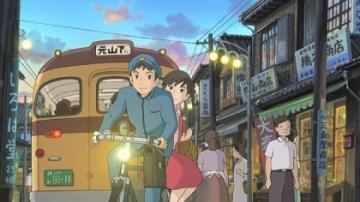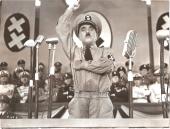A charmingly animated view `From Up on Poppy Hill'
Pop-music buffs of a certain age (a certain advanced age) may recall "The Sukiyaki Song," sung by Kyu Sakamoto, which hit No. 1 on the U.S. Billboard Chart in 1963 -- the only Japanese song ever to do so. Its English title reference to a hot-pot dish had nothing to do with the tune's actual name ("I Shall Walk Looking Up"), but was chosen solely to sound user-friendly for Americans. One wag said it was like retitling the Japanese version of "Moon River" as "Beef Stew."
In any case, half a century later, it's the nostalgic theme song of "From Up on Poppy Hill," a charming -- if not groundbreaking -- animated feature from Japan's famed Studio Ghibli.
No monsters, superheroes or talking animals populate Poppy Hill, which is situated high above Yokohama harbor. There, a serious girl named Umi lives in a boarding house with her grandmother, helping to run the place ever since her mother left for America. Each morning, she hoists signal flags in wistful honor of her father, whose ship sank during the Korean War (don't worry, he was on the "good" side).
It's half-past 1963, and all of Japan is eagerly anticipating the forthcoming Tokyo Olympics. Nobody's more excited about that than the boys at Umi's high school -- until they learn that their beloved old clubhouse, dubbed "The Latin Quarter," must be torn down to make way for something more suitably modern.
It's really a clubmansion rather than clubhouse -- Asian-Victorian Gothic in style, falling-down in disrepair, but full of nifty nooks and crannies containing the guys' archaeology, philosophy and debate clubs and the student newspaper (edited by Umi's boy crush, Shun). They're distraught at the prospect of losing their combination student union and bachelor pad.
Mickey and Judy would say, "Let's put on a show to raise money!" Umi and Shun say, "Let's redd up and restore the place to its past grandeur!" Which fits in with this year's Debate Club topic: "Can you get to the future without preserving the past?"
If the ramshackle Latin Quarter reminds you of the fantastic structures in Hayao Miyazaki's "Howl's Moving Castle" or "Spirited Away" (2002 Oscar-winner for best animated feature), you're a serious anime fan with an eye for hereditary talent: "Poppy Hill" was directed by Hayao's son, Goro.
But overall, the younger Mr. Miyazaki replaces the fantasy visions of his father with realist re-creations of a very specific time and place -- the 1964 Olympics that symbolized Japan's reemergence from World War II devastation and disgrace. Many Japanese still feel nostalgia for that era, which the Miyazaki animators render with such naturalistic fidelity that at times you forget it's animated.
You shouldn't. This is hand-drawn, not computer-generated, animation -- a fine and dying art, indeed.
"Manga" art, on the other hand -- cartoon-style drawings and storytelling in panels -- is alive and well, in and out of Japan. It first took root there during the U.S. occupation, not least of whose cultural influences were comic books brought over by GIs and the images of American television and movies -- Disney above all. Japanese of all ages love manga for its cinematic zooms, angles and shadows in a wide array of "graphic novel" genres: action-adventure, romance, science fiction, mystery, horror, sports and even pornography. Now an integral part of the Japanese publishing industry (to the tune of $6 billion annually), manga tales are first serialized in magazines or books and, if successful, can graduate to animé adaptations on Japanese TV and movie screens.
"Poppy Hill" is a fairly tame example of such, with its variation on the age-old theme of likable young lovers overcoming obstacles. Its round-faced characters (like their sweetly platonic romance) are on the bland side, and unremarkably drawn.
But details make art, my old art teacher used to proclaim, and the period details here are to die for: Freighters and tugboats crisscross the twinkling nighttime harbor. The school paper is laboriously hand-lettered and inked on an old stencil-mimeo process. The fresh fish and cooking oil sizzle sumptuously in Umi's skillet. Every frame is visually evocative.
There's some clever dialogue. When Umi asks where the philosophy club is located, one of the boys replies, "Upstairs -- just listen for the sound of smug pretentiousness." To deliver such lines in this English version, Mr. Miyazaki has hired a presumably overpriced set of Yankee voices (Jamie Lee Curtis, Beau Bridges, Ron Howard, Bruce Dern, etc.), not that you can easily distinguish them.
"Poppy Hill" doesn't dance on the cutting edge. But its gorgeous design, pacific mood and warm heart make it a sweetly sentimental Sukiyaki journey for kids, teens and adults alike.






